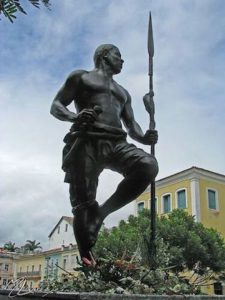
Palmares statue
*The Palmares community in 1605 is affirmed on this date. They are a Brazilian settlement of escaped and freeborn African slaves.
Palmares or Quilombo dos Palmares were located in Brazils Serra da Barriga hills. The term "Quilombo" is a link between Palmares and the culture of central Angola, where most slaves were forcibly brought to Brazil. During slave trafficking, natives in central Angola, called Imbangala, had created an institution called a "Kilombo." They were tribes of diverse lineages in a community designed for military resistance against their oppressors. The Palmares were legendary for their size and power. An independent, self-sustaining republic, at its height, it hosted a population of over 30,000 free Black African men, women, and children.
Palmares successfully defended itself militarily against several attempts by Dutch and, later, Portuguese colonial powers to destroy it and kill or capture its citizens. The Cafuzos, or Maroons, of Brazil, were fierce and cunning fighters trained in a martial arts form called Capoeira, developed in Brazil by African slaves in the 1500s. This acrobatic fighting style made the renegades of Palmares virtually unbeatable in hand-to-hand combat against the Europeans. The Portuguese defeated the Palmares community on February 6, 1694.
With over 54% of Brazil's country of African descent, the Palmares remain an active community in western Brazil. In 2017, as Brazil marked 130 years since the abolition of slavery, the descendants of runaway slaves have been celebrating two major victories in their long fight to get legal title to their land. In the northern state of Para, 500 of them in Quilombo Cachoeira Porteira took formal ownership of 543,631 acres this month, one of the largest such awards, after a legal fight that lasted more than two decades.
Some 16 million of the quilombolas, as the slaves' descendants are known, live in around 5,000 rural settlements, according to the Fundação Cultural Palmares. This government body preserves and promotes Afro Brazilian art and culture.
"The territorial guarantee is very important," said Juliana de Paula, a lawyer at the advocacy group Instituto Socioambiental (ISA). Yet the quilombolas face an uphill struggle as austerity measures have seen government departments cut to lift Brazil out of its worst recession in decades. INCRA, the government body tasked with managing and demarcating rural land, has seen its budget cut 90 percent since 2012 to just $1.46 million.
Erivaldo Oliveira, head of Fundação Cultural Palmares, said, "These communities can only have access to public policies if they have land titles." "The fight is very arduous ... we have to fight every moment as INCRA has no budget for land demarcation to quilombolas."
But threats are also looming from illegal loggers and gold miners encroaching on quilombola land. In a statement, INCRA said the February court ruling guaranteed legal security for land demarcation processes to benefit communities that lack titles. De Paula said, "The government cannot be negligent in claiming budget constraints forever." That lack of land titles also made the quilombolas more vulnerable to pressure and violence from illegal loggers and gold miners encroaching on their land.
The number of quilombolas murdered in Brazil reached a record high of 14 in 2017, up from eight deaths in the previous year and just one case in 2015, according to a National Coordination of Rural Black Communities survey. Advocacy group ISA said it was unclear whether the murders recorded in 2017 were related to conflicts over property. Still, at least six of those killed last year were leaders of the quilombola land rights movement.
The World Book Encyclopedia.
Copyright 1996, World Book, Inc.
ISBN 0-7166-0096-X